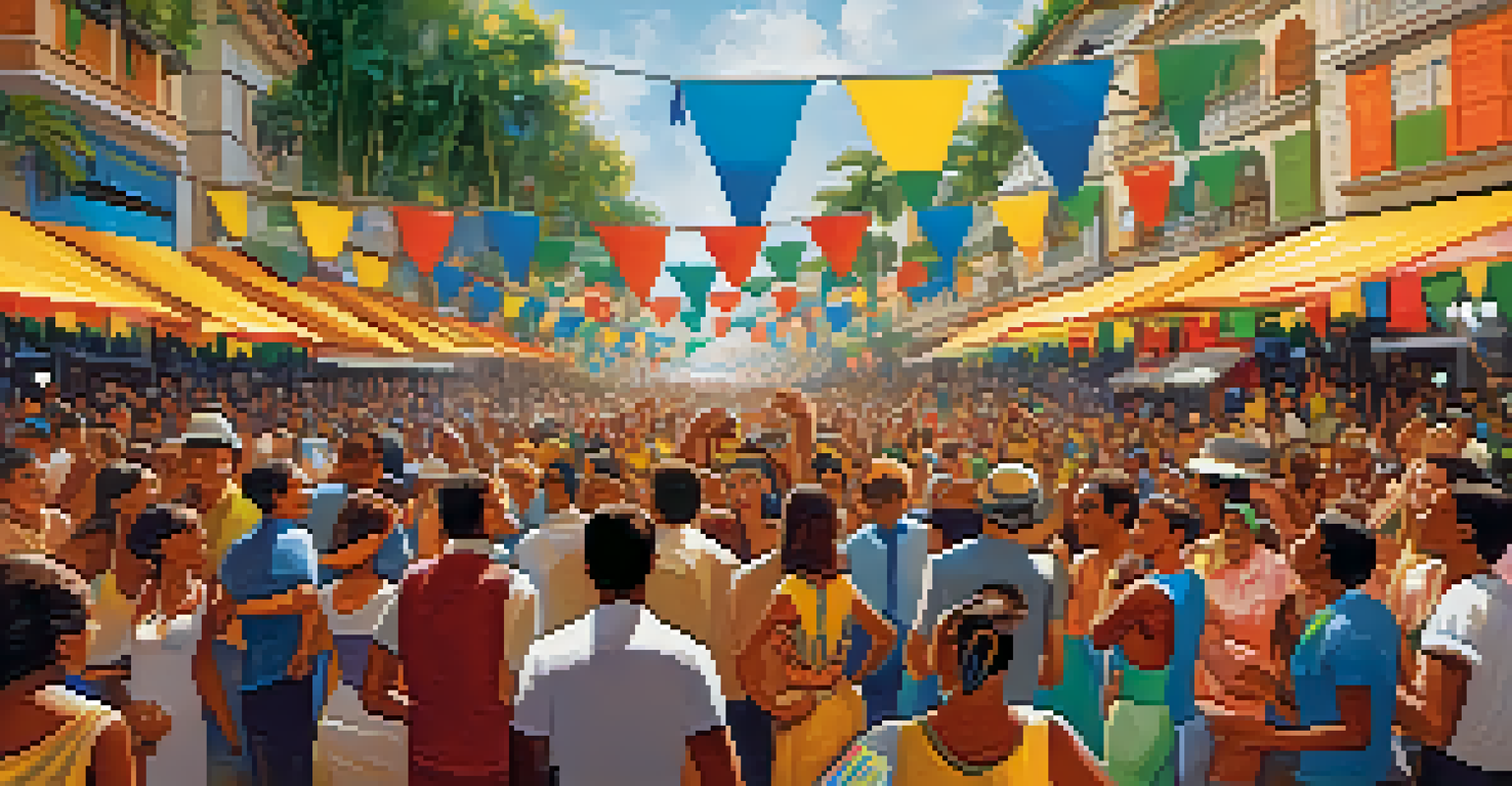Bossa Nova: The Soundtrack of Brazilian Beaches and Life

The Origins of Bossa Nova: A Cultural Fusion
Bossa Nova emerged in the late 1950s in Brazil, blending samba rhythms with jazz influences. This unique fusion reflected Brazil's rich musical heritage while introducing a modern twist. It was more than just music; it was a cultural movement that resonated with the social changes happening at the time.
Bossa Nova is not just a style of music; it’s a feeling that captures the essence of life in Brazil.
Artists like João Gilberto and Tom Jobim were pivotal in shaping this genre, bringing a fresh sound that captivated audiences. Their innovative use of guitar and soft vocal styles created a soothing ambiance, perfect for the beachside vibes of Brazil. This genre became synonymous with the laid-back lifestyle that many Brazilians embraced.
The term 'Bossa Nova' itself means 'new trend' in Portuguese, capturing the essence of this artistic revolution. As it gained popularity, Bossa Nova began to influence not just music but also fashion, film, and visual arts, marking its place in the heart of Brazilian culture.
Iconic Songs That Define Bossa Nova
Certain songs have become timeless classics, defining the Bossa Nova genre and its appeal. Tracks like 'Garota de Ipanema' (The Girl from Ipanema) convey the beauty of Brazilian beaches and the allure of its culture. With its smooth melody and evocative lyrics, this song captures a moment of longing and admiration, embodied by the vibrant life along the coast.

Another beloved piece is 'Desafinado,' which translates to 'Out of Tune.' This song cleverly plays with musical themes and conveys a deeper narrative about love and misunderstanding. The gentle rhythms and sophisticated harmonies have made it a staple in Bossa Nova playlists around the world.
Bossa Nova: A Cultural Fusion
Bossa Nova emerged in Brazil in the late 1950s, blending samba and jazz to create a unique musical and cultural movement.
These songs, among many others, continue to resonate not just in Brazil but globally. Their melodies transport listeners to sun-soaked beaches, where the gentle waves and warm breezes enhance the experience of this enchanting music.
Bossa Nova: The Soundtrack of Brazilian Beaches
Imagine lounging on the sandy shores of Ipanema, with the sound of gentle waves lapping at your feet. It’s a scene perfectly accompanied by Bossa Nova melodies drifting through the air. The genre has become synonymous with beach life in Brazil, creating an atmosphere of relaxation and joy.
Music is the universal language of mankind, and Bossa Nova speaks to the heart of every listener.
Whether it’s a sunset gathering with friends or a solo moment of reflection, Bossa Nova enriches these experiences. The soft, soothing rhythms provide a backdrop that encourages conversation and connection, embodying the Brazilian spirit of camaraderie and warmth. It's almost as if every chord strummed evokes the essence of the Brazilian coast.
For both locals and tourists, the music serves as a reminder of the carefree lifestyle that defines Brazilian beaches. Bossa Nova is more than just a genre; it’s an integral part of the beach experience, making every sun-soaked moment even more memorable.
The Global Influence of Bossa Nova
While Bossa Nova originated in Brazil, its influence has spread far beyond its borders. Musicians from various genres have embraced its rhythms, incorporating them into their own works. From jazz artists to pop musicians, the soft, syncopated beats of Bossa Nova have inspired countless songs around the world.
For instance, artists like Stan Getz and Astrud Gilberto helped popularize Bossa Nova in the United States during the 1960s, bringing its charm to new audiences. Their collaborations introduced Bossa Nova to jazz enthusiasts, merging two worlds in a way that felt fresh and exciting. This cross-pollination of styles helped solidify Bossa Nova's position in music history.
Timeless Classics of Bossa Nova
Iconic songs like 'Garota de Ipanema' and 'Desafinado' capture the essence of Brazilian culture and the genre's emotional depth.
Today, Bossa Nova continues to inspire a new generation of artists, both in Brazil and internationally. Its timeless appeal and emotional depth ensure that it remains a beloved genre, celebrated for its ability to connect people through music.
Bossa Nova's Connection to Brazilian Identity
At its core, Bossa Nova reflects the Brazilian identity, incorporating elements of culture, history, and social commentary. The music speaks to the heart of Brazil, showcasing its beauty while highlighting the complexities of life. Through its lyrics and melodies, Bossa Nova tells stories that resonate with both joy and melancholy.
Many songs explore themes of love, longing, and the everyday experiences of Brazilian life. This emotional depth makes Bossa Nova relatable, allowing listeners to connect with the music on a personal level. It's this blend of simplicity and sophistication that captivates audiences, drawing them into the narrative.
As Bossa Nova continues to evolve, it remains a powerful expression of what it means to be Brazilian. The genre captures the essence of the country’s diverse culture, celebrating its vibrancy while acknowledging its challenges.
The Future of Bossa Nova: Evolving with Time
As musical landscapes evolve, Bossa Nova is also undergoing a transformation. Contemporary artists are experimenting with the genre, blending it with modern sounds and styles. This fusion keeps Bossa Nova fresh and relevant, appealing to both longtime fans and new listeners alike.
Artists like Céu and Marcos Valle are pushing the boundaries, incorporating electronic elements and new rhythms into traditional Bossa Nova. By doing so, they are not only preserving the essence of the genre but also making it accessible to a younger audience. This innovation ensures that Bossa Nova will continue to thrive in the ever-changing music scene.
Bossa Nova's Global Influence
Originally from Brazil, Bossa Nova has inspired musicians worldwide, merging with various genres and continuing to evolve over time.
Ultimately, the future of Bossa Nova looks bright. Its ability to adapt while staying true to its roots is a testament to the genre's resilience and enduring charm. As new voices emerge, they will undoubtedly add to the rich tapestry of Bossa Nova, ensuring its legacy for generations to come.
Celebrating Bossa Nova: Festivals and Events
Throughout Brazil and beyond, Bossa Nova is celebrated in various festivals and events dedicated to its rich history and vibrant culture. Events like the Bossa Nova Festival in Rio de Janeiro bring together musicians and enthusiasts, creating a lively atmosphere filled with music, dance, and camaraderie. It’s an opportunity for fans to immerse themselves in the genre and appreciate its evolution.
These gatherings not only showcase established artists but also provide a platform for emerging talent. It’s a chance for new musicians to share their interpretations of Bossa Nova, keeping the genre alive and dynamic. The energy of live performances amplifies the experience, allowing attendees to connect with the music on a deeper level.

In essence, these festivals serve as a celebration of Brazilian culture, uniting people through the love of music. By participating in such events, fans help ensure that Bossa Nova remains an integral part of Brazil's cultural landscape for years to come.